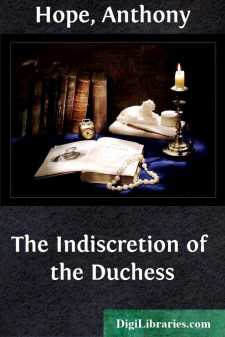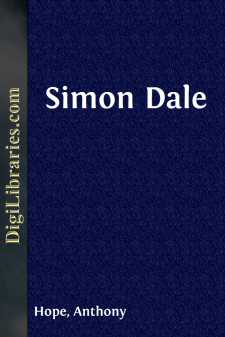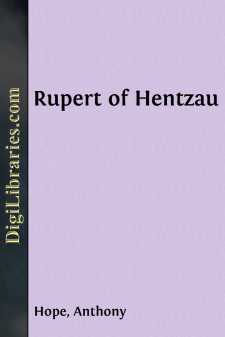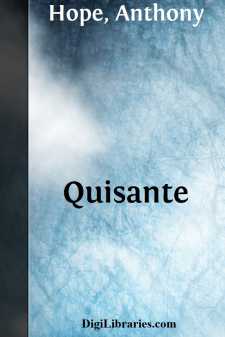Categories
- Antiques & Collectibles 13
- Architecture 36
- Art 48
- Bibles 22
- Biography & Autobiography 813
- Body, Mind & Spirit 142
- Business & Economics 28
- Children's Books 13
- Children's Fiction 10
- Computers 4
- Cooking 94
- Crafts & Hobbies 4
- Drama 346
- Education 46
- Family & Relationships 57
- Fiction 11828
- Games 19
- Gardening 17
- Health & Fitness 34
- History 1377
- House & Home 1
- Humor 147
- Juvenile Fiction 1873
- Juvenile Nonfiction 202
- Language Arts & Disciplines 88
- Law 16
- Literary Collections 686
- Literary Criticism 179
- Mathematics 13
- Medical 41
- Music 40
- Nature 179
- Non-Classifiable 1768
- Performing Arts 7
- Periodicals 1453
- Philosophy 64
- Photography 2
- Poetry 896
- Political Science 203
- Psychology 42
- Reference 154
- Religion 513
- Science 126
- Self-Help 84
- Social Science 81
- Sports & Recreation 34
- Study Aids 3
- Technology & Engineering 59
- Transportation 23
- Travel 463
- True Crime 29
Anthony Hope
Anthony Hope, born Anthony Hope Hawkins on February 9, 1863, was an English novelist and playwright best known for his adventure novel "The Prisoner of Zenda" (1894). The novel's success led to numerous adaptations and cemented Hope's place in literary history. Besides his notable works of fiction, Hope was also a barrister and had a brief political career before dedicating himself fully to writing.
Author's Books:
Sort by:
by:
Anthony Hope
A Suppressed Passage Mr Jenkinson Neeld was an elderly man of comfortable private means; he had chambers in Pall Mall, close to the Imperium Club, and his short stoutish figure, topped by a chubby spectacled face, might be seen entering that dignified establishment every day at lunch time, and also at the hour of dinner on the evenings when he had no invitation elsewhere. He had once practised at the...
more...
by:
Anthony Hope
CHAPTER I DOCTOR MARY'S PAYING GUEST "Just in time, wasn't it?" asked Mary Arkroyd. "Two days before theвÐâthe ceremony! Mercifully it had all been kept very quiet, because it was only three months since poor Gilly was killed. I forget whether you ever met Gilly? My half-brother, you know?" "Only onceвÐâin Collingham Gardens. He had an exeat, and...
more...
by:
Anthony Hope
CHAPTER 1 The Rassendylls—With a Word on the Elphbergs "I wonder when in the world you're going to do anything, Rudolf?" said my brother's wife. "My dear Rose," I answered, laying down my egg-spoon, "why in the world should I do anything? My position is a comfortable one. I have an income nearly sufficient for my wants (no one's income is ever quite sufficient, you...
more...
by:
Anthony Hope
CHAPTER I. A PIOUS HYPERBOLE. Before my coronation there was no event in childhood that impressed itself on my memory with marked or singular distinction. My father's death, the result of a chill contracted during a hunting excursion, meant no more to me than a week of rooms gloomy and games forbidden; the decease of King Augustin, my uncle, appeared at the first instant of even less importance. I...
more...
by:
Anthony Hope
Chapter I. A Multitude of Good Reasons. In accordance with many most excellent precedents, I might begin by claiming the sympathy due to an orphan alone in the world. I might even summon my unguided childhood and the absence of parental training to excuse my faults and extenuate my indiscretions. But the sympathy which I should thus gain would be achieved, I fear, by something very like false...
more...
by:
Anthony Hope
CHAPTER I THE CHILD OF PROPHECY One who was in his day a person of great place and consideration, and has left a name which future generations shall surely repeat so long as the world may last, found no better rule for a man's life than that he should incline his mind to move in Charity, rest in Providence, and turn upon the poles of Truth. This condition, says he, is Heaven upon Earth; and...
more...
by:
Anthony Hope
CHAPTER I. THE QUEEN'S GOOD-BY A man who has lived in the world, marking how every act, although in itself perhaps light and insignificant, may become the source of consequences that spread far and wide, and flow for years or centuries, could scarcely feel secure in reckoning that with the death of the Duke of Strelsau and the restoration of King Rudolf to liberty and his throne, there would end,...
more...
by:
Anthony Hope
DICK BENYON'S OUTSIDER. A shrunken sallow old lady, dressed in rusty ill-shaped black and adorned with an evidently false 'front' of fair hair, sat in a tiny flat whose windows overlooked Hyde Park from south to north. She was listening to a tall loose-built dark young man who walked restlessly about the little room as he jerked out his thoughts and challenged the expression of hers. She...
more...
by:
Anthony Hope
CHAPTER I. THE IMPOSSIBLE—INEVITABLE. In the garden the question was settled without serious difference of opinion. If Sir Robert Perry really could not go on—and Lady Eynesford was by no means prepared to concede even that—then Mr. Puttock, bourgeois as he was, or Mr. Coxon, conceited and priggish though he might be, must come in. At any rate, the one indisputable fact was the impossibility of...
more...
by:
Anthony Hope
RELUCTANCE. Neither life nor the lawn-tennis club was so full at Natterley that the news of Harry Sterling's return had not some importance. He came back, moreover, to assume a position very different from his old one. He had left Harrow now, departing in the sweet aroma of a long score against Eton at Lord's, and was to go up to Oxford in October. Now between a schoolboy and a University man...
more...











